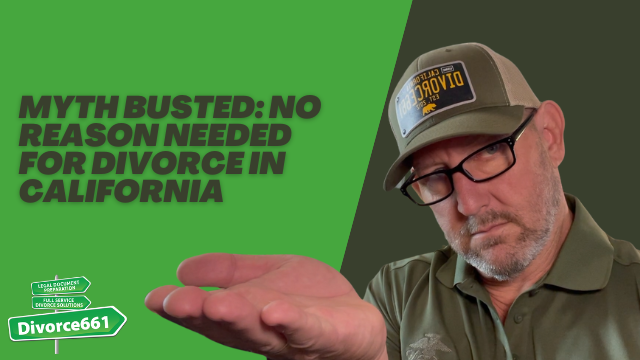Myth Busted: No Reason Needed for Divorce in California
When it comes to divorce in California, there are a lot of myths floating around. One of the most common misconceptions is that you need to have specific grounds for divorce. The reality is quite different, and understanding the truth can save you a lot of stress and confusion during what is already a challenging time.
The No-Fault Divorce System
California operates under a no-fault divorce system. This means that you don’t need to provide a specific reason to file for divorce. The only requirement is to cite “irreconcilable differences.” This makes the process less adversarial and allows couples to move forward without having to prove wrongdoing.
What Are Irreconcilable Differences?
Irreconcilable differences can be anything that has led to the breakdown of the marriage. It’s as simple as saying that two people have grown apart or have different life goals. In fact, I’ve encountered cases where spouses still love each other but realize they are on different paths. That alone is sufficient grounds for divorce in California.
Why You Don’t Need Grounds for Divorce
Many people worry that they need to provide evidence of wrongdoing, such as adultery or abuse, to file for divorce. In California, this is not the case. The court does not require you to state any grounds in the divorce petition, nor do they consider it during proceedings. The focus is entirely on the irreconcilable differences between the couple.
The Role of the Court
The court’s primary concern is to finalize the divorce and address matters such as property division and child custody. They are not interested in the reasons behind the divorce. Whether one spouse wants the divorce or both do, it doesn’t matter. The law allows for a divorce to proceed as long as one party expresses the desire to end the marriage.
Amicable Divorces Are Possible
Even if one spouse is resistant to the idea of divorce, California law allows the process to continue. Many couples find themselves in situations where one partner wants out while the other is still attached. In these cases, it’s crucial to approach the situation with understanding and a willingness to be amicable.
Finding Common Ground
Even if one partner isn’t keen on getting divorced, acknowledging that the other wants to move on can help facilitate a smoother process. Couples often realize that they prefer to end things amicably to avoid prolonged conflict. This is where communication plays a vital role. Open discussions can lead to agreements that are beneficial for both parties.
Common Misconceptions About Divorce in California
There are many myths surrounding divorce that can complicate the process. Here are a few more misconceptions that deserve to be addressed:
Myth 1: You Need to Prove Fault
As previously mentioned, California does not require you to prove any fault. This is a significant relief for many couples as it removes the stress of having to gather evidence or testify against each other.
Myth 2: Only One Party Can File for Divorce
Another common myth is that only one spouse can initiate the divorce process. In California, either spouse can file for divorce, regardless of the circumstances. If one partner is ready to move on, the other can either agree or contest, but the filing can still proceed.
Myth 3: The Court Will Care About the Reasons for Divorce
The court does not care about the reasons behind the divorce. They focus solely on the facts presented and the legal implications of the divorce. Understanding this can help alleviate some of the emotional burdens associated with the process.
Emotional Considerations
Even though California’s no-fault divorce system simplifies the legal process, it doesn’t eliminate the emotional challenges that come with divorce. It’s important for both parties to acknowledge their feelings and approach the situation with empathy.
Coping with Change
Divorce can be a major life change, and it’s natural to feel a mix of emotions. Whether it’s sadness, relief, or anxiety, recognizing these feelings can help you navigate the process more effectively.
Seeking Support
Many people find comfort in talking to friends, family, or professionals during this time. Support systems can provide the encouragement and perspective needed to make informed decisions throughout the divorce process.
Conclusion
In California, you don’t need specific grounds to file for divorce. The no-fault system allows couples to end their marriage based on irreconcilable differences without the added stress of proving fault. Understanding this can empower individuals to take the necessary steps to move forward with their lives. Whether you’re in the early stages of contemplating divorce or are well into the process, remember that support is available, and you don’t have to go through this alone.
For those considering divorce, it’s essential to gather accurate information and seek guidance tailored to your specific situation. Remember, the goal is to find a resolution that works for both parties, allowing both individuals to move forward into the next chapter of their lives.

